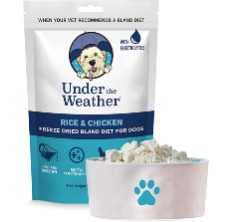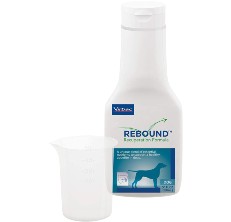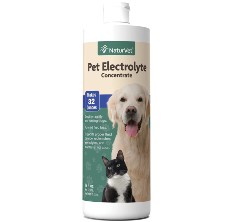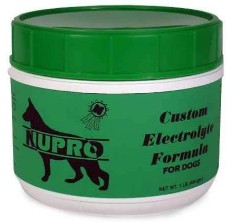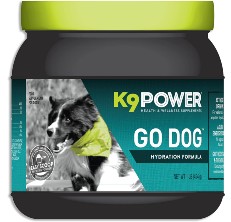- Home
- Gear Categories

Last updated: 31 May 2024
We independently research, test, review, and recommend the best products - learn more about our process here. If you buy something through our links, we may earn a commission.
Give your Dog An Energy boost with the Top Dog Electrolytes
Published 24 Nov 2020
Show contents
Leading Dog Electrolytes of 2024 – A Guided Review
Is your dog dull, lazy and just sad? And you have been doing everything right and just can’t figure out what is wrong? Then we know exactly what you need. Just keep reading and find out what you can do to give your dog the boost it requires. Every parent wishes to see their child happy, active, and on top of every game, and the same goes for dog moms and dads. Why not? Dog electrolytes are something that can help you balance everything and anything that is troubling your fur baby!
Dog electrolytes might seem like additional nutrients or supplements to your dog’s diet. Still, they are essentials that ensure that everything else you are feeding your dog is effective and fully received. Dog electrolytes ensure your dog is healthy, active and free of any discomfort. Let us hop on and review the leading electrolytes for dogs in 2024 and help you provide the best and nothing less for your dogs and pups!
Leading Dog Electrolytes of 2024 – A Guided Review
1
Under the Weather Pets | Easy to Digest Bland Dog Food Diet
– Best OverallTHE SCOOP
Under the weather, pets have introduced their dog electrolytes that are not just of top-notch quality but full of goodness. Loaded with all the essential electrolytes, including potassium and sodium, help with optimum muscles’ optimum functioning after your dog has been depleted of them. The food is dried frozen, which means it is first dropped at an extremely low temperature and then dried, locking all its nutrients in it along with the nutritional value, flavor and color.
Once your dog has been through sickness and is struggling with getting back on its feet, the greatest service you can do is provide them with electrolytes. Under the weather, products are gluten-free and have no additional flavors to keep them authentic. The pack includes chicken meat and rice with the highest human grade ingredients ensuring quality. The electrolytes can help your pup fight diarrhea, digestion and other food allergies.
Pros
- It can be used for all breeds and sizes
- Includes delicious flavors of rice and chicken
- Easy to digest
Cons
- Might taste bland
2
Rebound Recuperation Formula for Dogs
– Runner UpTHE SCOOP
Virbac’s recuperation formula for dogs is the one that you need to feed your dog. It will help your dog bounce back from any illness and get him back to a healthy and active routine. When he falls sick, every dog needs some supplement to support him, and Virbac has actually gotten all the support in a cup. Instead of preparing, diluting, and mashing healthy food items, you can simply include the fluid in your dog’s routine.
One cup of Virbac’s formula promises to make your dog’s immunity stronger and give it all the antioxidants that it needs. Instead of force-feeding your dog or pushing him to chew when he barely has the energy to stand, you can just help him gulp it and let it rest. Wait for a few hours and see the magic! Virbac’s fluid therapy contains essential nutrients, antioxidants, omegas and prebiotics formulated to promote hydration, nutrition and a happy dog!
Pros
- Easy to use – You just have to make your dog drink it.
- Can be fed with or without food
- Easy to pour bottle
Cons
- It might not taste great
3
NaturVet Pet Electrolyte Concentrate for Dogs and Cats
– Honorable MentionTHE SCOOP
Garmon corp’s NaturVet pet electrolyte is one solution for many problems and a fantastic diet supplement for service dogs. Since it is in the form of a liquid, it is easy to use and quick! You don’t have to spend hours or even minutes preparing them. You can just pour and give your dogs a boost. The solution contains water, sodium chloride, potassium citrate, and bisulfate that help balance the dog’s electrolyte to keep it going and give a nourished life.
The liquid does not include electrolytes, but it also contains vitamins and omegas that are needed making it a complete meal. Sometimes, the dogs are moody and refuse to eat anything. You slowly pet it and administer the liquid. Since it’s a concentrate, you need to use the correct portions of water and the proper concentrate portions. Helps you maintain balance, hydration and is the perfect fix for mild fluid loss.
Pros
- Suitable for agility and hunting dogs
- Loaded with benefits
- Easy to feed
Cons
- Needs to be prepared by diluting it in water
4
Nupro Nutri-Pet Research Electrolytes for Dogs
– Also ConsiderTHE SCOOP
Nupro Nutri-pet electrolyte formula is simple yet effective. Comes in a simple green box with complicated but essential nutrients inside. Designed especially for dogs that need to perform and have high physical activity. The formula has been made using the perfect minerals and nutrients ratio that guarantees great health and performance. Along with being a great supplement, the dog formula can also help improve your dog’s performance with heightened senses.
In essence, the formula helps and aids your dog’s body sustain, replenishing, and reviving the fluid balance. These problems can occur if your dog has been doing a lot of work lately or has survived through sickness, which might have drained him off of his nutrients. Then this is the ideal supplement for your fur baby with the advantages of calcium, potassium and sodium. There comes a feed chart with the product based on the weight of the dog.
Pros
- Can be fed with solid & liquid food
- Helps fight fatigue, nausea and diarrhea
Cons
- It can only be used as a supplement
THE SCOOP
K9 Power is packed with power and nutrients for your 4 pawed friend who needs it the most. Your dog does so much for you, and it does deserve an energy punch drink that helps him get all his energy back! The mixture is so easy to make that you just need to stir it in water and give your dog the drink as a reward for all he does for you and your family. Basically, the drink refills your dog’s lost nutrients and water to ensure the dog is healthy and active!
K9 Power’s formula is also a total hydration drink that provides a short burst and a long-range energy fuel that can keep your dog upbeat. The formula includes electrolytes that are essential and provides carbohydrates that keep up the energy and maintain hydration, digestion, and muscle strength. K9 claims to have used 100% human-grade ingredients, which speaks about the nutritional value of the product and the value for money.
Pros
- A clean energy source
- Includes energy boosters with essential nutrients
- Comes with a money-back guarantee
Cons
- Might not suit your dog
Buying the Best Dog Electrolyte of 2024 – A guide
After a long day of work and play, your dog might have run out of energy and stamina. We, as humans, also get tired so do our dogs! A sunny day can truly dehydrate us, and all we look for is a quick energy drink, so do our dogs. For dogs, we have Dog electrolyte formulas that keep them going and protect them against disease. A good formula should help your dog build stamina, strengthen immunity, fight digestion problems and stay hydrated. There are many dog electrolyte formulas available in the market, but you need to choose the best for your dog so keep reading as we guide you about what to look out for!
Ingredients
All dog electrolytes include trace earth metals necessary for your dog, from sodium to potassium to calcium. Other than that, these formulas contain omegas, vitamins and carbohydrates that help give your dog an immediate boost of energy.
Dosage
Each formula has a different dosage. There is no fixed formula as each formula has different ratios. You should not feed your dog more than required as it may cause irreversible damage to your dog’s organs. Most dog electrolytes come with instructions about dosage based on your dog’s weight. You may follow that or just ask your vet, and he can recommend a routine based on your dog’s health. Sometimes, the dosage is weekly or monthly, depending on your dog’s size and its health.
Amount
A dog can generally handle 30g of electrolyte every day. But do not mix and match the amount as you wish. If the instructions guide 1 scoop for every cup of water, follow that or do what your vet has recommended.
Texture
We have seen these formulas majorly in two forms: powder and liquid. Powders are usually mixed with water to make a drink or just simply mixed with food. On the other hand, concentrated liquids are diluted with water as they are primarily concentrated.
Moreover, we have also noticed freeze-dried electrolytes that must be heated up before feeding and then brought back to room temperature.
Taste
Although most electrolytes claim to have some flavor, the taste is usually lacking. Your dog may or may not like artificial flavors or colourings. It is best to check with your vet if your dog is allergic to any.
Packaging
Most powder electrolytes come in jars, and the liquid ones come in longer bottle-shaped jars. Each comes with convenient packaging. All you need to do is to ensure the packaging is fit for storing. Some powders also include scoops as measurement tools. A scoop can genuinely be a blessing in disguise.
People Also Asked
Q: How to prepare dog electrolytes?
A: For freeze-dried products, you need to mix the contents of the pouch with boiling hot water. Then you must stir them to ensure that they have integrated well. Then let it cool to an edible temperature. Now, it is ready to serve! For liquid concentrate, you need to mix with an adequate amount of water and serve your dog. For powders, you can either mix with biscuits, jelly, food or just make your dog eat it raw. You may also mix it with drinking water, making a thick mixture.
Q: Can I replace my daily dog food with dog electrolytes?
A: No. While dog electrolytes might seem packed with more energy and benefits, we must remember that this is an intermittent diet and only supplementary to your dog's normal food. It can never be given in proportion equal to or similar to normal dog food.
Q: How often can I feed my dog?
A: The dosage can be given based on the activity schedule of your dog. You can discuss your dog's routine with your vet, and he can design a plan for you. If your dog's activity is more than usual, your vet might prescribe a larger quantity and vice versa. Also, the weight and size of your dog play a huge role in deciding the feeding routine for your dog.
Q: Are these supplements healthy?
A: Yes! They are loaded with omegas, vitamins and nutrients that are all essential for your dog's survival.
Q: When do I feed dog electrolytes to my dog to ensure that he performs the best?
A: You can feed the dog before, during and after intensive exercise or routine. However, for daily use just give him a dose 6-7 hours before the walk, and you are good to go.
Q: How can I store a mixture if my dog does not consume it?
A: If your dog has refused to drink or eat the mixture, you can keep it in your fridge for up to 3-4 hours unless stated otherwise.
Q: Do these supplements have any side effects?
A: No, in the shorter run. They only help your dog live an active and happy life.
Q: Can my dog overdose on these supplements?
A: Yes, your dog may overdose on these supplements if you overfeed him. It can result in difficulty breathing, high blood pressure and eventually, the situation may turn fatal.
Contributors
Former Special Forces Canine Handler
